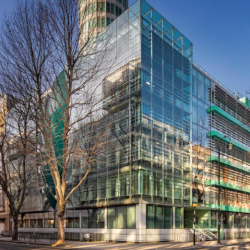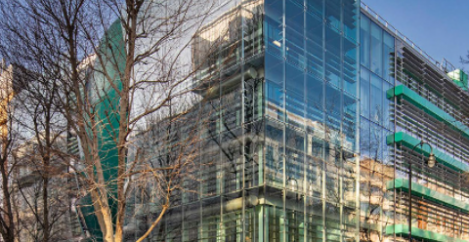October 29, 2021
Activity climbs in third quarter for London office market
 The latest research from Avison Young claims that the London office market’s recovery continued in the third quarter of 2021, with activity in the occupier market increasing to 2.4 million sq ft, 26 percent above the previous quarter and 1.1 percent above the 10-year quarterly average.
The latest research from Avison Young claims that the London office market’s recovery continued in the third quarter of 2021, with activity in the occupier market increasing to 2.4 million sq ft, 26 percent above the previous quarter and 1.1 percent above the 10-year quarterly average.
Building on the momentum generated during the first half of 2021, a third consecutive increase in both the total amount of space let and the volume of completed transactions indicates that post-pandemic return-to-work and occupation strategies are being implemented by London’s occupier base.
This was underpinned by a series of large-scale commitments from occupiers, with 11 lettings above 50,000 sq ft signed. This is the most in an individual quarter since Q3 2019, as London’s businesses continue to welcome their workforce back to the office en masse and formalise their post-pandemic occupational strategies for the years ahead.
Key statistics and highlights of the occupier market in Q3:
• Total office space take-up across Central London rose to 2.4m sq ft in Q3 2021, 26 percent above Q2 2021 and 1.1 percent above the 10-year quarterly average.
• Five deals above 100,000 sq ft and 11 lettings above 50,000 sq ft completed during the quarter – the most in a single quarter since the end of 2019 and led by Facebook’s lease of 312,000 sq ft at 1 Triton Square, NW1.
• The Office Group signed the largest individual serviced office deal since Q3 2019 – agreeing a pre-let for 170,000 sq ft at the R8 Building at King’s Cross Central, N1, maintaining the upswing in activity seen within the flex sector last quarter.
• Led by the Facebook deal, the TMT and Creative sector was the most active of the quarter comprising 33 percent of quarterly take-up. This was followed by Financial Services and Professional Services, accounting for 23 percent and 14 percent respectively.
• Availability has tapered off over the last six months, having risen for five consecutive quarters across 2020 and early 2021. The amount of available space now totals 21.3 million sq ft, which, although reflective of a 1 percent drop against the previous quarter, is still 38 percent ahead of the ten-year average.
• The central London vacancy rate has fallen to 7.3 percent, down 0.1 percentage points on the previous quarter.
James Walker, Principal, City Office Agency, Avison Young, said: “There is a pervading sense of cautious optimism across the London market going into the final quarter of the year.
“Occupational activity rebounding at the same time as the gradual return of the workforce indicates that companies are beginning to formalise their post-pandemic location strategies. As such, we may see competition emerge among firms for best-in-class office space as wider corporate goals around sustainability and talent retention yet again come to the fore.
[perfectpullquote align=”right” bordertop=”false” cite=”” link=”” color=”” class=”” size=””]”There is a pervading sense of cautious optimism across the London market going into the final quarter of the year”[/perfectpullquote]
“While this is likely to exact further upward pressure on prime headline rents, there is a possibility of further bifurcation within the market as lower-grade or older space becomes comparatively less attractive to occupiers. In turn, however, this may increase the potential for refurbishment or value-add investment opportunities for an active pool of investors across the capital wishing to target well-located office buildings in need of modernisation and improving their ESG credentials.”
Following an active second quarter, momentum has gathered in the London office investment market with almost £3.1bn transacting over the last three months. This quarterly volume is almost a threefold increase on the same period in 2020, and boosts rolling 12-month purchase volumes to £11.9bn – the highest it has been since Q2 2019.
In addition, Q3 was the busiest by number of transactions since the onset of the pandemic, with 44 individual deals completing. Of these, 19 were for purchases above £50m – also a post-Covid record.
Foreign buyers continued to propel the market, with almost 80 percent of the quarterly turnover coming from overseas investors. This increase in activity reflects the expanding pool of buyers looking for a variety of opportunities within the capital; with downward pressure being exacted on yields as global investors compete for London office assets.
Key statistics and highlights of the investment market in Q3:
• Q3 2021 saw £3.06 billion transact – 13.2 percent below the 10-year quarterly average but an almost threefold increase on the £1.2 billion figure for Q3 2020.
• The quarter saw the highest number of transactions since the onset of the pandemic, with 44 individual deals completing, of which 19 were above £50m. The highest value of these was Generali’s acquisition of Times Square, EC4 for £464 million at a 3.93 percent yield in August.
• In a reversal of the previous quarter, the West End regained its place as the most active subregion, attracting deals worth £1,247 million, while the City saw £980.5 million of deals.
• £2.375 billion of investment came from overseas investors, while UK institutions provided £570 million of investment and UK property companies £42 million.
• Prime yields remained stable across Central London – these are 3.25 percent in the West End and 4.0 percent in the City.
Dominic Amey, Principal, Central London Investment, Avison Young, said: “With domestic and international restrictions beginning to ease and life coming back into London’s occupational market, we are witnessing the gradual release of pent-up demand for London office assets.
“This demand has been supported by London’s reputation as a safe haven for investors during periods of economic uncertainty. With the further easing of international travel restrictions at the start of October, we expect that that the final quarter of 2021 will see a continuation of improving investor sentiment, underpinned by the continued rebound in London’s occupier market. Once circumstances allow, we are anticipating an influx of capital from Asian investors, with heavyweights from Hong Kong, Malaysia, China and Singapore surely looking to flex their muscle in the capital before too long.”
Read the full report here.
















